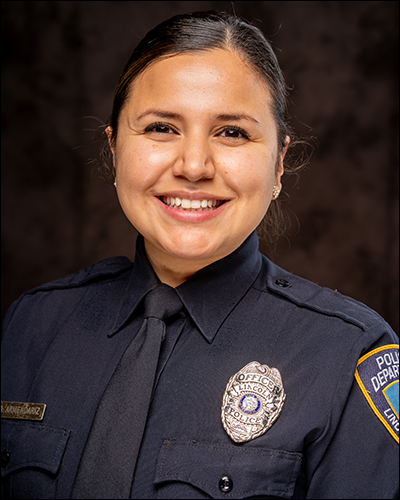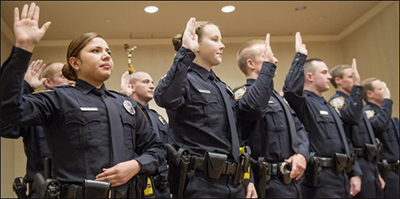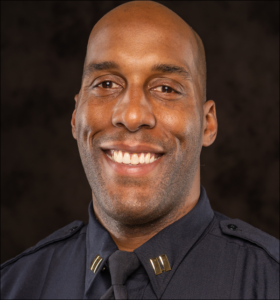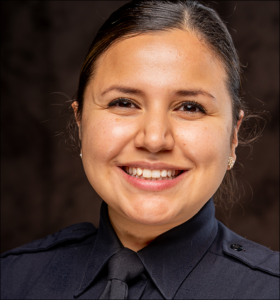GISELLE HOGAN

Giselle Hogan has become a friendly face for many members of the Lincoln’s Hispanic community during her years with the Lincoln Police Department.
As a street patrol officer for her first four years on the department, Hogan, who is bi-lingual and Hispanic, found herself running into people who didn’t speak English and responding to many calls from fellow officers for Spanish to English translating help.
“You could see the relief, when they saw me pull up and heard me start speaking in Spanish,” Hogan said. “They are like, ‘thank goodness, can you tell them what I am trying to say?’ …I am very proud of my roots and enjoy helping people.”
Depending on her case load as a criminal investigator, she isn’t as available as she once was to provide translation services for calls. However, there is an interpreter list so other bi-lingual officers are able to assist. Hogan said her dual language abilities still serve her well in her new permanent role as a criminal investigator.
“There is a lot of need for language,” said Hogan, whose investigations job entails following up on felony cases, completing legal process like carrying out warrants and subpoenas, interviewing victims and suspects and investigating deaths. “A lot of the witnesses I speak with and some of the victims I talk with only speak Spanish so I am able to communicate with them. It’s a good feeling to be able to help in that capacity.
 “It’s rewarding when you are able to solve a case and help a victim. A lot of times when you first meet them, they are at their worst time. Giving people closure is the best part of the job.”
“It’s rewarding when you are able to solve a case and help a victim. A lot of times when you first meet them, they are at their worst time. Giving people closure is the best part of the job.”
Hogan’s desire to assist and be compassionate to all non-English speakers she encounters is fueled by her own personal journey.
She said she remembered the feeling of being a Spanish-only speaking student in second grade, and all the communication barriers this caused her as she was trying to make new friends and adapt to a new school. Hogan had been born in the United States but grown up around extended family in Mexico for a couple years during her childhood. Her family then returned to United States and settled in Kansas when she was about 7 years old. This was when she started learning English.
“I remember feeling like an outcast when I didn’t speak English,” Hogan said. “Language can be a culture barrier. I was pretty young, so I picked up the language fairly quickly.”
After graduation from high school, Hogan attended the University of Nebraska-Lincoln due in large part to its Criminal Justice major. She had wanted to be a prosecuting attorney when she began college, but eventually changed her mind. While at UNL, she worked for the Nebraska Department of Corrections as an intern. Through this school-required program, she got first-hand experience of what it was like to work at the Lincoln Correctional Center. After going through a five-week academy, she wore a uniform and went around with all the full-time corrections staff members at the jail.
While that experience didn’t translate into a career she wanted to pursue, it did reaffirm her interest in criminal justice, and she applied for an officer opening with the Lincoln Police Department. At 22 years old, Hogan received a conditional offer, went through the training academy and has been with LPD ever since.
Hogan said earning one of the permanent criminal investigator roles is one of the accomplishments she is most proud of during her time at LPD.
“My ability to speak Spanish gave me a lot of investigative opportunities,” Hogan said.
Hogan and the late Mario Herrera used to be the only Hispanic employees in the investigations department before his untimely passing on Sept. 7, 2020 after being shot while serving a warrant on Aug. 26, 2020.
“I didn’t work with him too long as I joined in 2020, but we would banter back in forth in Spanish about the correct way to say certain words,” Hogan said. “I did look up to Mario. I feel like because of my language, that opened doors for my investigative side. If it was Mario’s day off and they needed a Spanish speaker, they would call me.”
Hogan also is the head of the Hispanic/Latino Committee that was recently started within LPD.
“This is commissioned and non-commissioned employees and people don’t have to be Hispanic or Latino to be a part of it,” Hogan said. “It includes about 7 or 8 people who are interested in being involved with the Hispanic/Latino community.”
The committee works closely with the non-profit organization El Centro de las Americas and has done surveys with the Hispanic community and given them opportunities to ask LPD employees questions. The committee plans to release an educational video in Spanish about “What to do during a traffic stop.”
By far the most popular events the committee members take part in are the soccer games with the Latino Youth Soccer Club at Park Middle School once a month. Thankfully for Hogan, having a soccer background is not required.
“I usually play goalie,” Hogan said. “Or go and interact and take photographs.”
Hogan is also part of the recruitment team at LPD.
“I will go out to job fairs,” Hogan said. “I will have people come up to me and some of those questions revolve around my race and language.”
Being so involved internally, Hogan’s friendly face is known by many of her co-workers and the leadership of the department.
“I’ve done a lot of recruiting videos so my image is out there,” Hogan said. “I don’t know if that has influenced anyone to choose a career path in law enforcement. When doing these recruiting events, I have heard many people say that seeing an officer who looks like them, they are more inclined to ask questions and pursue that as a career path.
“It opens a lot of doors. For recruitment I think representation matters. I think our police department should reflect our community. We have a growing Hispanic community in our city. They are victims of crimes too and we should have resources available to those people. As police officers, our job is to give people resources with whatever they are going through. I think that partnerships with groups like El Centro are valuable because we are able to give them assistance specific to their needs. I think it’s important to be able to communicate with who is showing up at your door.”


